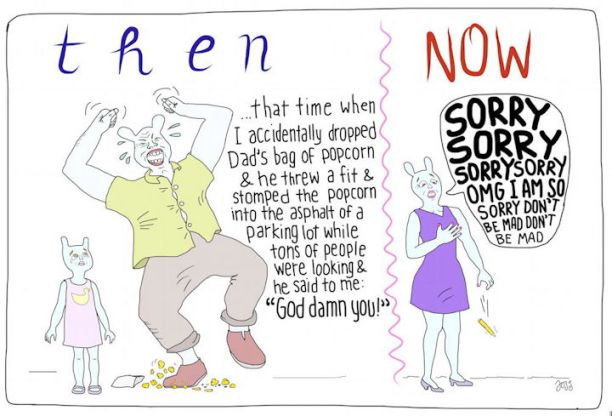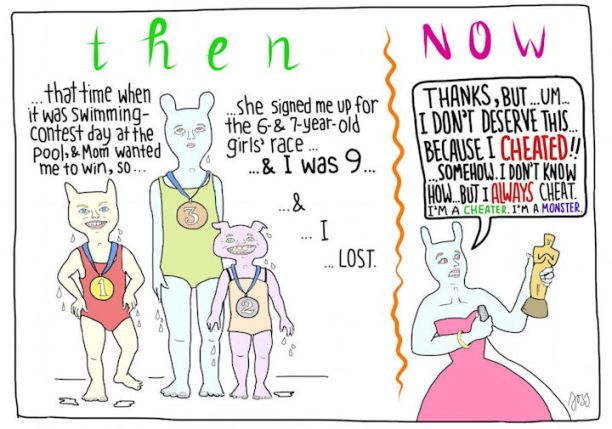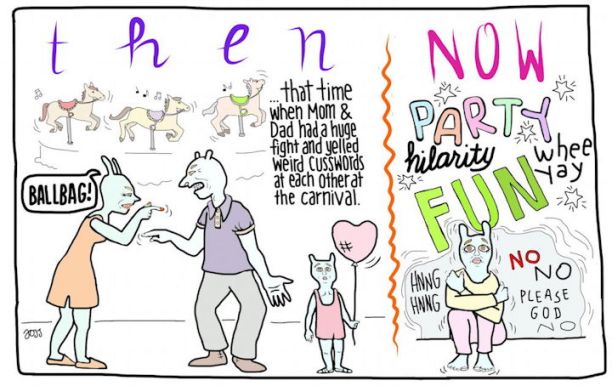
I’m tired of being told that my traumas don’t count because, compared to being bayoneted, they are tiny.
I’m tired of my traumas being mocked, invalidated and disqualified because they entail neither fire, war nor dismemberment. I’m tired of my traumas affecting my current behavior, long after the fact. I’m tired of being told (as if I hadn’t spent my whole adult life trying) to grow up and shut up and get over it because the only battleground on which my traumas took place was a sunshiny, three-meals-a-day suburban childhood.
Granted, under all that sunshine the grownups I loved and trusted terrified me—hour on hour and day by day, as other grownups might play Candy Crush, or sing.
They told me they could read my mind. They said that if I lied, they’d know and feel it like a stab. Their spittle specked my glasses as they screamed that my cluttered closet and yellow teeth were my deliberate attempts to punish them. They told me my friends hated me. They told me cars are two-ton death machines and every ride (even this one, to pick up scrumptious Chinese takeaway) could be my last. They burst into unforeseeable rages. They warned me never to let anyone kiss me. They said God was waiting breathlessly to kill us all.
They told me this was all for my own good.
I’m not the only adult still struggling with such encounters decades after (I tell myself) any sane person would have blithely forgotten them. I’m not the only adult sifting through strata of being raised wrong: Shaming. Blaming. Impossible expectations. Neglect. Narcissism. Absent boundaries. And telling myself: STFU, you spoiled brat.

We are a tribe: we, the tinily traumatized.
We are those who are anxious, anorexic, depressed, misanthropic, self-destructive and/or paranoid because of things seen, felt and heard when we were too young to do anything but absorb and believe it all.
Too young to know that the adults who held our lives in their hands could be wrong, weird, struggling with depression or addiction or a thousand other things—and for whose issues which weren’t our fault, or even, often, theirs—we pay a lasting price.

Recent research reveals that emotional and verbal maltreatment can be as damaging over the long-term as is physical violence.
Groundbreaking new studies show that survivors of childhood emotional and verbal maltreatment are just as likely as survivors of childhood physical maltreatment to later suffer from depression, anxiety, sexual problems and low self-esteem. Both groups also find decision making and impulse control equally difficult. Childhood emotional and verbal maltreatment has even been linked to adult physical disorders such as IBS.
Don’t let anyone tell you that your traumas weren’t traumas.
Don’t let anyone tell you that your traumas don’t count because other people bled from theirs. Don’t let anyone tell you that your traumas weren’t traumatic because those who traumatized you meant no harm but loved you (as, like me, you loved them) and were proud of you. Don’t let anyone tell you that your triggers don’t go boom. Don’t let them say it’s laziness or stubbornness or spoiledness that makes you struggle to rise from bed, dress and step out the door into a crowded and potentially cruel world. When pleasure makes you want to run away, don’t let anyone tell you that this isn’t post-traumatic stress.
We needn’t play the victim card or call in sick from life itself. But by acknowledging what happened to us, naming it, no longer minimizing or denying it or thinking we deserved that shock or fear or pain, we can assess its aftermaths, the ways our tiny traumas make us act today.
This can make us hate ourselves less.
Author: Anneli Rufus
Editor: Catherine Monkman
Artwork: Author’s Own






Read 2 comments and reply